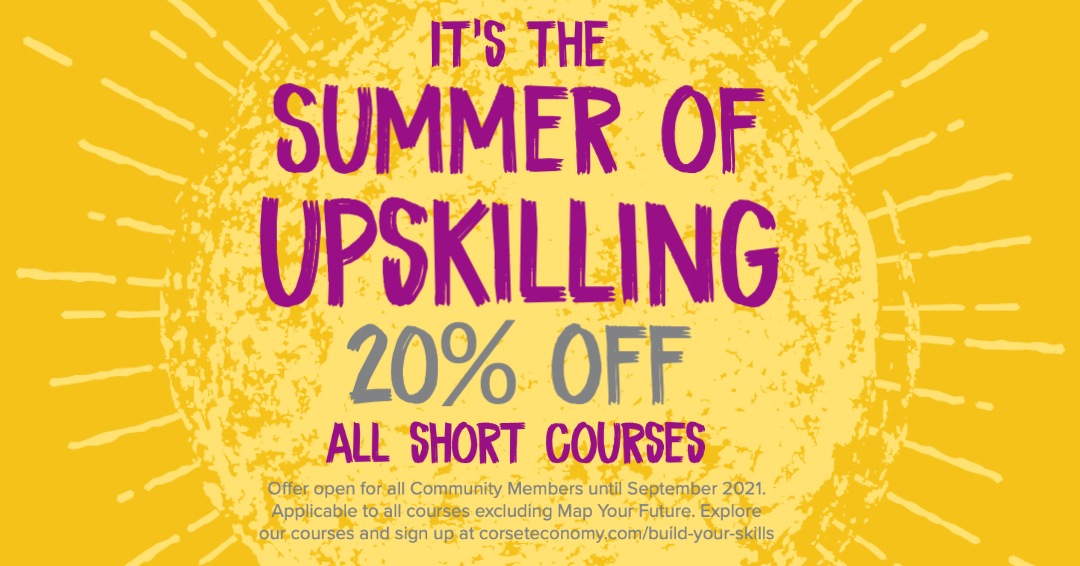The Corset Economy guide to Upskilling

Upskilling means learning – a proactive approach to staying relevant in your career. Upskilling is both a verb and a mindset. To really succeed you’ll have to keep on learning and upskilling, constantly working out how to reinvent your skills to stay ahead of the game.
Today we’re facing two global drivers that are simultaneously putting relentless pressure on the world of work. The problem is two-fold. A globalised workplace means that jobs can often be outsourced to somewhere where they can be undertaken more cheaply or simply – or, without humans at all.[1] While AI hasn’t as yet surpassed human intelligence (predictions are that we could reach ‘Singularity’ as early as 2030) robotics offer an option to producers and employers that is a whole lot cheaper and more convenient. Where once we saw businesses grappling with the relentless threat of disruption, it has now moved to the individual level.
‘Globotics’, the combination of increasing globalisation and robotics, has put paid to jobs for life, or even a career ladder. There are predictions that today’s students will have on average six careers over the course of our lifetime, of which 60% of those jobs do not yet exist.[2] This is where the future comes in, as you need to be prepared, alert and ready when these jobs materialize. There are also predictions that 21st century career is one of hybrid jobs, defined as “jobs that create whole new categories by mashing up disciplines”[3]. These jobs are not ones you can prepare for through the normal education channels, at least as yet.
In this world of change, skills are your currency. Skills, not qualifications, are your passport to success.[4] It is important to differentiate several different kinds of skills. Cognitive skills – both hard and soft skills – are the most important, while motor skills have become less valued as robotics continue to displace many blue collar jobs. Hard (cognitive) skills are those you learn at school, university, college or on the job. They are what we’ve historically focused on. Today there is growing interest in soft skills, also called transferable skills or 21st century skills. Of these, cognitive skills like systems thinking, problem solving, critical thinking, knowledge management, digital fluency, data fluency and creativity are generally considered the most important – because they can’t be done by machines. Then there are the social skills like communication and collaboration, which make it possible to work in non-hierarchical groups. Emotional skills are also key here.
Upskilling means, essentially, learning to unbundle and rebundle your skillset so that it remains fresh and relevant in a changing job market. This is why it requires a radically different mindset to the 20th century model. DIY education is likely to become ever more important, perhaps even being as prevalent as daily brushing of our teeth. This will mean daily learning of something new, such as industry podcasts or tutorials on skills for your job, for say 15 minutes a day. The art of upskilling will be to decide what to learn – and here it pays to critically take stock of what you have, and then focus on where you want to go and what you want to do.
We’ve identified six steps to upskill. We recommend undertaking these steps every 6-12 months, or maybe every 3 months in a time of transition.
- Create your current skills inventory: Identify your hard skills and your soft skills.
- Overlay with your experience inventory (your CV)
- Check for other skill sources by looking laterally – you might find transferable skills (and ones you love!) in the kitchen, study, garage, or on the sports field…
- Identify your critical skills gaps, and decide how best to fill them.
- Take action, bearing in mind that the more regularly you learn, the easier it will become. Don’t forget that you need to apply your skills so that they’re proven and up to date.
- Repeat. The world of work rewards learners, so this process will be an iterative one.
We believe upskilling is, literally, the #1 skill of all. We’ve a series of courses on Upskilling for you, and this summer, to get you going, we’re offering a 20% discount off all our short courses for all our Community members (you can sign up below). This is the Summer of Upskilling. Get ready – NOW!
[1] Baldwin, R (2019) The Globotics Upheaval: Globalization, Robotics and the Future of Work. Weidenfeld & Nicholson
[2] Spackman, A (2019) in Frey et al (2019) TECHNOLOGY AT WORK v4.0: Navigating the Future of Work. Citi GPS: Global Perspectives & Solutions. June 2019
[3] Burning Glass, “Blurring lines: How business and technology skills are merging to create high opportunity hybrid jobs,” http://burning-glass.com/research/hybrid-jobs/; See also Deloitte Insights (2017) Catch the wave: The 21st-century career, in The changing nature of careers in the 21st century | Deloitte Insights
[4] Merrill, N (2019) Punch Doubt in the Face: How to Upskill, Change Careers and Beat the Robots.
